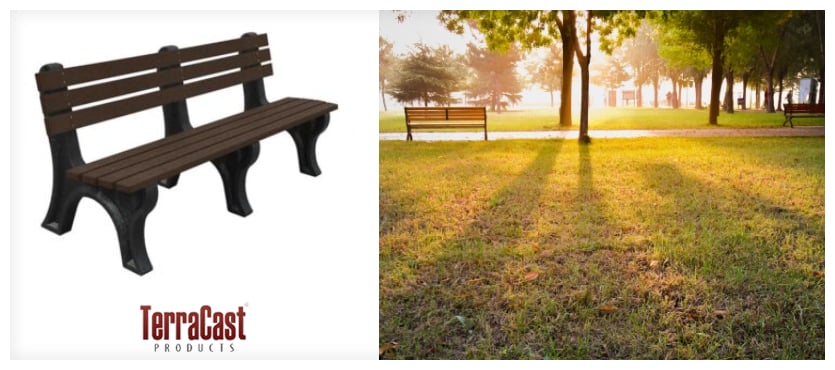As cities grow and evolve, the importance of creating spaces that serve everyone—regardless of age, ability, or mobility—is more vital than ever. Inclusive public space design goes beyond aesthetics. It ensures that parks, plazas, sidewalks, and transit hubs are functional, safe, and welcoming for all. From the layout of a park bench to the height of a planter, small design choices can make a big difference in how people interact with their surroundings.
Resin furniture offers unique advantages in the pursuit of accessibility and inclusion. With its versatile design options, lightweight structure, durability, and low maintenance, resin products help urban planners and municipalities meet ADA guidelines while enhancing the experience for everyone who uses public space.
The Foundations of Inclusive Design
Inclusive public design means more than just adding ramps and signage. It’s about removing barriers—physical, sensory, and psychological—so people of all abilities can move through and enjoy a space. This includes ensuring appropriate seat height for people using mobility aids, maintaining clear sightlines and navigation paths, using surfaces that are safe and comfortable in all weather, and offering opportunities for social interaction, rest, and participation.
Designing for accessibility helps cities become more equitable, promoting social inclusion and community well-being. Street furniture plays a surprisingly important role in achieving these goals.
Why Resin Furniture Is an Accessibility Ally
Lightweight and Easy to Position
Resin furniture is significantly lighter than traditional materials like concrete or metal. This means benches, planters, and other fixtures can be positioned and repositioned with relative ease, allowing cities and planners to adapt public spaces to suit diverse user needs. Whether it’s adjusting furniture to ensure wheelchair clearance or reconfiguring a space for a community event, resin allows for flexibility without the need for heavy equipment.
Ergonomic Designs that Meet Everyone’s Needs
Public seating must serve a variety of users—from children and seniors to those with disabilities. Resin furniture can be molded to precise ergonomic standards, providing consistent seat heights, armrests, and back support that promote comfort and safety. Benches with armrests, for example, assist individuals who need support to sit or stand. Smooth edges and uniform surfaces help reduce trip hazards or pressure points. Unlike wood or metal, resin doesn’t heat up excessively in the sun or splinter, making it safer and more comfortable for prolonged use.
ADA Compliance and Customization
Many cities must comply with ADA (Americans with Disabilities Act) guidelines, which outline specific requirements for seating, clearance, and reachability in public areas. Resin furniture is an excellent solution because it can be custom-molded to meet these standards. If a bench with specific height and spacing is needed for accessible routes, or a planter requires clearance for wheelchair users to participate in gardening programs, resin offers the kind of customization that ensures compliance without compromising on design.
Visual and Tactile Accessibility
Inclusive design also considers people with visual impairments or sensory sensitivities. Resin furniture can be manufactured in contrasting colors, helping users navigate spaces more intuitively. Unlike metal, resin surfaces won’t become dangerously hot or cold, offering a safer tactile experience for individuals with limited vision or touch sensitivity.
Durability in High-Traffic, Inclusive Environments
Parks, transit hubs, and recreational spaces designed for everyone also tend to be heavily used. Durability is essential in ensuring that accessibility features remain safe and functional over time. Resin furniture is highly resistant to vandalism, graffiti, UV exposure, weather damage, and impact and wear. Its long lifespan means that public spaces stay functional and welcoming with minimal maintenance or replacement, keeping them accessible and cost-effective.
Supporting Community-Centered Urban Design
Inclusive design is not just a regulatory checkbox—it’s a commitment to creating spaces that reflect the diversity and dignity of a community. Resin furniture supports this mission by enabling planners to think creatively and compassionately about space. From conversation corners with benches to adaptive-use gardens with resin planters designed for wheelchair access, the potential to build better experiences is vast.
By removing traditional limitations in weight, shape, or finish, resin opens up new possibilities for user-friendly, community-oriented design. It’s not about offering special accommodations—it’s about designing for everyone from the start.
A Path Toward More Inclusive Cities
Accessible public spaces are the backbone of connected, livable cities. With its versatility, safety, and ease of use, resin furniture offers a powerful tool for designing environments that welcome all individuals—from seniors and children to people with disabilities and everyone in between.
TerraCast® is proud to support inclusive urban planning through our line of durable, American-made resin furniture and planters. To discover how TerraCast® products can help you create more welcoming and accessible public spaces, contact us today.

